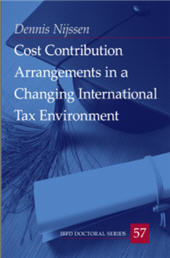2021 - IBFD Publishing
E-book
Versione Digitale
Download | Copia/Incolla (illimitata)
Cost contribution arrangements in a changing international tax environment
 E-PUB
Disponibile anche in PDF
E-PUB
Disponibile anche in PDF xx, 321 p.
- Includes bibliographical references (p. 307-321).
- Technological advancement and globalization have dramatically impacted the business models of multinational enterprises (MNEs). They have opened new markets, enhanced international collaboration and increased the relevance of intangibles in value chains. All of this has undeniably contributed to more economic growth and global prosperity. It has, however, also substantially complicated the world of international tax law, posing complex challenges in day-to-day fiscal practice and causing public concern about aggressive tax planning and potential tax avoidance by MNEs. Difficulties become especially apparent where companies belonging to the same multinational group collectively develop their most valuable (intangible) business assets or centralize the performance of critical group services.
- MNEs often structure such intragroup collaboration in legal agreements that foresee a joint ownership of results and that allocate the cost of the shared activities in proportion to each participant's anticipated benefits. These agreements are commonly referred to as cost contribution arrangements (CCAs) or cost sharing arrangements (CSAs). They are a pragmatic tool to allocate a significant part of the MNE's costs and income among the participating group companies. At the same time, and for the same reason, they are also frequently found to play a critical role in tax planning structures. This study sets out to investigate why CCAs are accepted as a legitimate transfer pricing instrument, and it analyses the most relevant rules and regulations governing their tax and transfer pricing treatment. It further outlines how effective those rules are at facilitating bona fide CCAs as well as countering the use of CCAs for tax avoidance purposes. [Publisher's text]
- Thesis.
- 766441 characters
-
Informazioni
ISBN: 9789087226602
COLLANA


